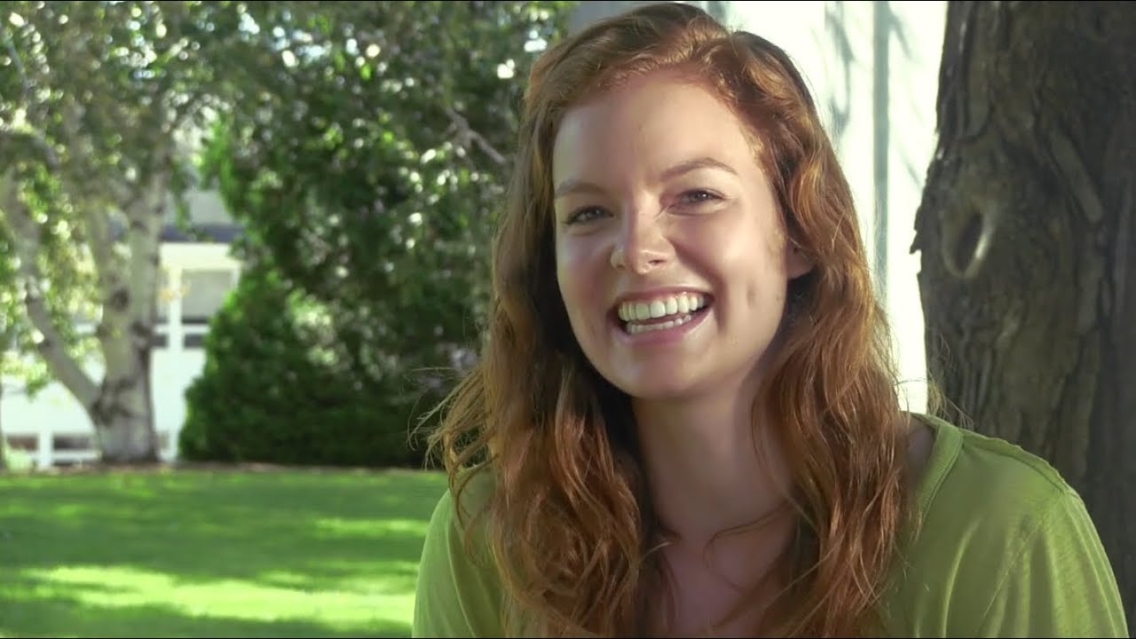Proficiency Gains
Quickly acquire linguistic and cultural fluency—results you’ll take pride in for life.
Find out why Middlebury was ranked the Best Foreign Language Program.
"Oops, I forgot my English!"
Find more videos on our YouTube channel.
In class we usually have to focus on a lot of, our content is more. And when we’re in the, when we’re in the cafeteria we also can learn how to speak like colloquial. Participate in extracurricular, yeah, like kung fu or volleyball. So what was that again? What did I say?
I said, sorry. Yeah, it is a little bit hard. Okay. I’m thinking. Day and night. Everyday, you have to speak Chinese. It’s like chop, chop, chop, chop, chop.
I think because when we are in class we usually concentrate most of our energy on formal written Chinese. But because during meal time we eat with teachers, friends, and other students we can learn how to speak colloquially and this is very useful.
Within a summer, students in our immersion programs make substantial progress in language and cultural proficiency. Graduate students refine their skills to communicate at an advanced proficiency level in a broad range of academic or professional settings.
Immersion Students
Our internal assessments and external research have proven that our immersion students experience the following:
- Make substantial progress in language proficiency, generally equivalent to at least one year of rigorous undergraduate study. Students receive 9 college credits for the 7-week immersion programs, and 12 college credits for the 8-week immersion programs.
- Develop accuracy in the target language superior to participants in study-abroad programs of equal length.
- Develop pragmatic socio-cultural competence to communicate effectively and appropriately in a wide range of environments.
- Achieve proficiency within the ranges aligned with ACTFL/CEFR standards upon completion of each level (depending on the language):
- Level 1: Novice High to Intermediate Low/A1+ to A2
- Level 2: Intermediate Mid to Intermediate High/A2+ to B1+
- Level 3: Intermediate High to Advanced Low/B1+ to B2+
- Level 4: Advanced Low to Advanced High/B2 to C1
See individual language pages for more detailed level information.
Graduate Students
Upon graduating with an MA or DML degree, our students are able to do the following:
- Communicate their knowledge (written and spoken) at advanced levels in the language of study, which will allow them to present their ideas in an academic or professional setting in a nuanced manner.
- Develop in-depth knowledge in an area of study in the humanities or interpretative social sciences.
- Conduct original research in their chosen area of concentration.
Current or aspiring language teachers especially benefit from a graduate degree from Middlebury. Chinese, Hebrew, Japanese, and Korean are designed around training language teachers for adult and private school settings. Arabic, French, German, Italian, and Spanish offer a dedicated pedagogy track with a curriculum focusing on foreign language teaching methodology and second-language acquisition research.
Our DML programs require teaching practice, and equip teachers to research and improve their own teaching practice and practices in the wider field. Additionally, our MAT program equips students to teach world languages in American public middle and high schools.
Research
The following peer-reviewed research studies conducted at Middlebury Language Schools provide more detailed information about the impact of our programs:
- Dewey, D. P. (2004). A comparison of reading development by learners of Japanese in intensive domestic immersion and study abroad contexts. Studies in Second Language Acquisition, 26(2), 303–327.
- Dewey, D. P. (2007). Japanese vocabulary acquisition by learners in three contexts. Frontiers: The Interdisciplinary Journal of Study Abroad, 15, 127–148.
- Freed, B. F., Segalowitz, N., & Dewey, D. P. (2004). Context of learning and second language fluency in French: Comparing regular classroom, study abroad, and intensive domestic immersion programs. Studies in Second Language Acquisition, 26(2), 275–301.
- Fukuda, M. (2014). Dynamic processes of speech development by seven adult learners of Japanese in a domestic immersion context. Foreign Language Annals, 47(4), 729–745.
- Isabelli-García, C., & Lacorte, M. (2016). Language learners’ characteristics, target language use, and linguistic development in a domestic immersion context. Foreign Language Annals, 49(3), 544–556.
- Liskin-Gasparro, J. E. (1998). Linguistic development in an immersion context: How advanced learners of Spanish perceive SLA. The Modern Language Journal, 82(2), 159–175.
- Merrill, J., Dengub, E., & Pastushenkov, D. (2021). Language gains in intensive synchronous online and face-to-face Russian immersion programs: A comparison. Russian Language Journal, 71(2), 87–120.
- Merrill, J. (2020). Student perceptions of a total immersion environment. In J. Bown, W. Baker Smemoe, & D. P. Dewey (Eds.), Language learning in foreign language houses (pp. 169–204). IALLT.
- Rifkin, B. (2005). A ceiling effect in traditional classroom foreign language instruction: Data from Russian. The Modern Language Journal, 89(1), 3–18.

